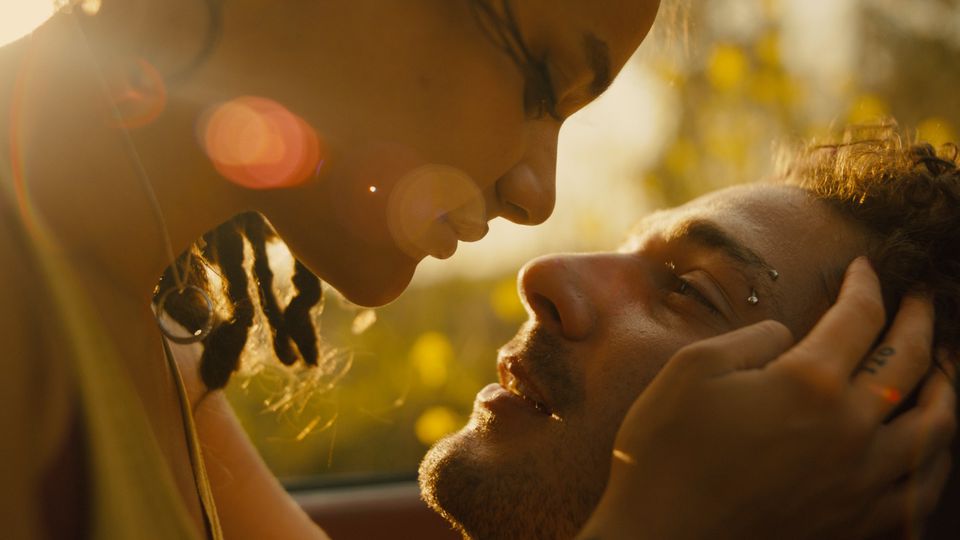American Honey [2016], an indie movie involving road trips, atypical camerawork, and teenagers blossoming into adulthood. Sounds cliché, doesn’t it? Well, I’m here to say you’re right. In this case, our teenager is a girl named Star (Sasha Lane), who gets the heck out of where she was and hops aboard a van with a group of door-to-door magazine salespeople around her age. We watch her as she tries to turn this into self-sufficiency.
Aimless Wandering (A.K.A. The Story): A big factor in this story is the fact that there isn’t an end-goal, we’re just kinda along for the ride, seeing what might happen. Just watch our characters cruise along, see what they see and share their experiences? Well, not so much in this case. Considering that said experiences basically amount to the same crap, over and over. Star has to adapt to this new life of hers, struggle and all. And that’s it for the rest of the movie, she struggles, with no significant change to her situation. There’s nothing to cheer for, nothing to fear for. We’re along for a frickin’ boring ride. By the end of it all, you won’t know why it even ended. The story just stops, in spite of the fact that both the main plot and about fifty sub-plots have led to absolutely no pay-off. This is an unsatisfying story, and I doubt it would have been otherwise if the characters were actually compelling.
Why Should I Care?: So, Star, the person we follow through the story - who is she? The hell if I know. She’s a teen stuck in a crappy house and a crappy relationship, which are crappy because of reasons. So she jumps when the opportunity comes a-knockin’ in the form of Shia LaBoeuf. Is she funny? No. Is she admirable? Definitely not. Is she sympathetic? Not really. We don’t know a thing about her past and why she is who she is. Right away, that’s a lost opportunity to develop a liking for the character (sad backstory, and all that), maybe make us understand why she’s not all of those things. I guess that’s just how this movie chooses to roll. I get that, it’s not like a movie that focuses mostly on the present can’t work (just look at Fury Road). However, this movie makes a habit of calling upon Star’s past to get the point across. Only, we don’t get the point because we don’t know that past. e.g. She’s rather anti-religious, but why is that? Why should we take it as anything other than prejudice? Why use it in the story if it doesn’t have any context: no loss of faith to sympathize with, for example. She’s just bitter, and we’ve got no reason to see her as anything but that. The most we get is the stereotypical “I can take care of myself” impulsive actions from the teenage protagonist. And without actually liking her in the first place, stereotypical is all that comes off as.
“Notice my Directing!”: Last chance time, is the movie good-looking? Well, it certainly thinks it is. But it thought wrong! Time and again, the camera focuses on something or other to create a theme for the scene. For instance, it might focus on bugs as a way of getting across how dirty a place might be. But that’s the exception to the rule. The general rule is that the movie is creating themes for no good reason, focusing on crap in an attempt to seem deep. It’s the equivalent of writing a story and filling it with long words to make it seem smart when in reality it only distracts the reader by taking attention away from the plot and making us wonder why it’s there in the first place. It just interrupts the flow rather than help it along. And we need the flow of the story to be constant in order to get the proper effect, pay-off. At the other end of the spectrum, though, I can say that the direction is also used in good ways. The camera often tends to stay with the characters at an intimate distance, making us feel involved with them rather than watching them at arms’-length. This way, we can see every expression and movement, letting us know exactly what the characters are thinking and feeling. Such a thing would be great for our involvement: letting us know that the characters are happy, thus making us happy for them. Unfortunately, it’s wasted in this movie, considering the characters are still unlikable.
American Honey is the indie film you’re afraid all indie films are like.

